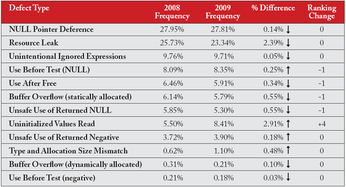Coverity Finds Fewer Defects in Open Source Software
The code analysis specialists Coverity attest to a quality improvement in the open source software they tested.
Coverity investigates code from diverse open source applications in conjunction with the U.S. Department of Homeland Security. The agency sees the investigation and the resulting improvement in quality as important because more and more state agencies are relying on free and open software.
Projects can post a request for analysis on the Coverity website and then provide the source code. Among the projects are Firefox, PHP and Linux itself. Coverity's report reveals that finding around 11,000 defects in 2009 meant a 16% reduction over the last year.
Coverity categorizes the projects into rankings based on the quality of their coce. So far only four projects have achieved the highest ranking, Rung 3, Samba, tor, OpenPAM and Ruby. By Coverity's account, they analyzed over 60 million lines of code since the start of their investigation in 2006. The method they use is static analysis, where the code is read directly for security and performance issues without actually running the app. So it tests not so much how it runs but how the code is structured and how it might lead to a faulty sequence of operations.
The full Coverity report for 2009 is available in PDF format.
Subscribe to our Linux Newsletters
Find Linux and Open Source Jobs
Subscribe to our ADMIN Newsletters
Support Our Work
Linux Magazine content is made possible with support from readers like you. Please consider contributing when you’ve found an article to be beneficial.

News
-
The Next Linux Kernel Turns 7.0
Linus Torvalds has announced that after Linux kernel 6.19, we'll finally reach the 7.0 iteration stage.
-
Linux From Scratch Drops SysVinit Support
LFS will no longer support SysVinit.
-
LibreOffice 26.2 Now Available
With new features, improvements, and bug fixes, LibreOffice 26.2 delivers a modern, polished office suite without compromise.
-
Linux Kernel Project Releases Project Continuity Document
What happens to Linux when there's no Linus? It's a question many of us have asked over the years, and it seems it's also on the minds of the Linux kernel project.
-
Mecha Systems Introduces Linux Handheld
Mecha Systems has revealed its Mecha Comet, a new handheld computer powered by – you guessed it – Linux.
-
MX Linux 25.1 Features Dual Init System ISO
The latest release of MX Linux caters to lovers of two different init systems and even offers instructions on how to transition.
-
Photoshop on Linux?
A developer has patched Wine so that it'll run specific versions of Photoshop that depend on Adobe Creative Cloud.
-
Linux Mint 22.3 Now Available with New Tools
Linux Mint 22.3 has been released with a pair of new tools for system admins and some pretty cool new features.
-
New Linux Malware Targets Cloud-Based Linux Installations
VoidLink, a new Linux malware, should be of real concern because of its stealth and customization.
-
Say Goodbye to Middle-Mouse Paste
Both Gnome and Firefox have proposed getting rid of a long-time favorite Linux feature.

